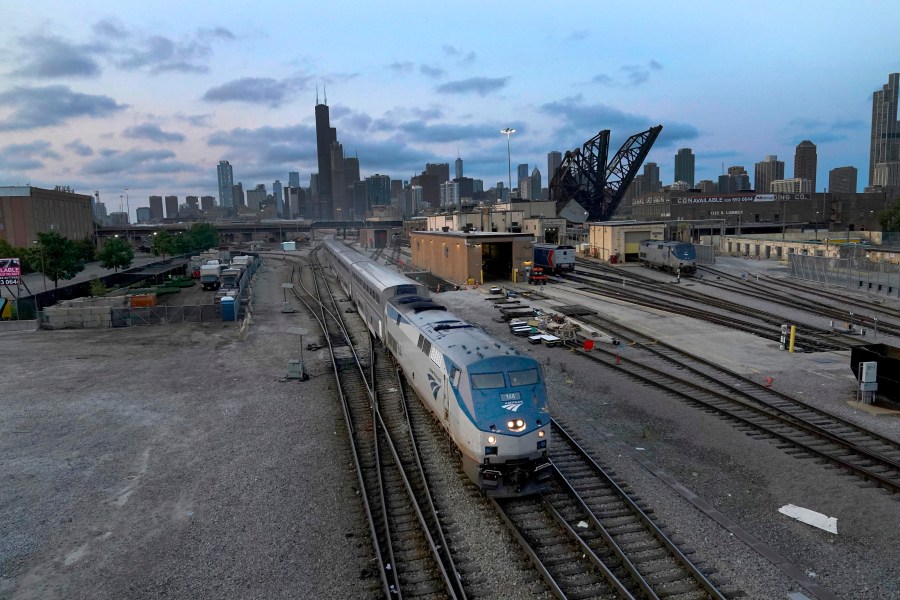WASHINGTON (NewsNation) — President Joe Biden said Thursday a tentative railway labor agreement has been reached, averting a potentially devastating strike before the pivotal midterm elections.
Railroads and union representatives had been in negotiations for 20 hours at the Labor Department on Wednesday to hammer out a deal, as there was a risk of a strike starting on Friday that could have shut down rail lines across the country.
Biden said the tentative deal “will keep our critical rail system working and avoid disruption of our economy.”
Biden made a key phone call to Labor Secretary Marty Walsh at 9 p.m. as the talks were ongoing after Italian dinner had been brought in, according to a White House official insisting on anonymity. The president told the negotiators to consider the harm to families, farmers and businesses if a shutdown occurred.
What resulted from the back and forth was a tentative agreement that will go to union members for a vote after a post-ratification cooling-off period of several weeks.
“These rail workers will get better pay, improved working conditions and peace of mind around their health care costs: all hard-earned,” Biden said.
The five-year deal, retroactive to 2020, includes the 24% raises and $5,000 in bonuses that a Presidential Emergency Board recommended this summer. But railroads also agreed to ease their strict attendance policies to address some of the unions’ concerns about working conditions.
Railroad workers can now take unpaid days off for doctor’s appointments without penalty. Previously, workers would lose points under the attendance systems that the BNSF and Union Pacific railways had adopted, and they could be disciplined if they lost all their points.
Eric Finley, a member of the Brotherhood of Locomotive Engineers and Trainmen called the agreement a “tremendous victory” for the union and railroad workers.
“This is what we’ve been pushing for, for some years,” Finley, who’s been a locomotive engineer since 1989, said. “We work on a different type of schedule. The average American that is working nine to five, weekends off— we’re more on a 24-hour on-call basis. So for us, pushing for a higher quality of life, vacation days, sick days, leave, you know, it really has a tremendous impact on us and our families.”
A strike would have impacted the entire nation, Finley pointed out.
“We supply a lot of grains, a lot of different materials, everyday household supplies. The stores will be affected as far as the products on the shelves,” Finley said. “It would be devastating to allow this to go on.”

It’s not just freight that would have been affected had a strike occurred but traveling passengers as well. Amtrak had said Wednesday that in anticipation of the strike, it was canceling all long-distance routes Thursday. After news of the deal broke, however, Amtrak sent out a statement saying it is “working to quickly restore canceled trains” and reach out to affected customers.
“This tentative agreement will keep our trains moving, stations bustling, and employees proudly serving customers as we move them across this great country, stimulating local economies in more than 500 communities we serve,” Amtrak CEO Stephen Gardner said in a statement. “Railroads play a vital role in the nation and we thank President Biden, Secretaries Buttigieg, Walsh and (Tom) Vilsack, the major freight railroads and rail labor unions for their hard work and commitment to get this deal done.”
In Chicago, Metra, the rail service that carries passengers into and out of the city, had said that it planned to cancel some service on trains leaving after 9 p.m. Thursday. Had a strike happened, there would have been no service Friday on the BNSF, Union Pacific North, Union Pacific Northwest and Union Pacific West lines.
But on Thursday, Metra expressed relief that a tentative agreement was reached, and said that late Thursday evening trains initially canceled will now run as scheduled.
The threat of a shutdown had put Biden in a delicate spot politically. The Democratic president has said he believed unions built the middle class, but he also knew a rail worker strike could damage the economy ahead of the midterms.
United Auto Workers Local 598 member Ryan Buchalski introduced Biden at the Detroit auto show on Wednesday as “the most union- and labor-friendly president in American history.”
In the speech that followed, Biden recognized that he wouldn’t be in the White House without the support of unions such as the UAW and the International Brotherhood of Electrical Workers, saying autoworkers “brung me to the dance.”
But without a deal among the 12 unions in talks back in Washington, Biden also knew that a stoppage might have begun as early as Friday that could halt shipments of food and fuel at a cost of $2 billion a day.
Far more was at stake than sick leave and salary bumps for 115,000 unionized railroad workers. The ramifications could extend to control of Congress and to the shipping network that keeps factories rolling, stocks the shelves of stores and stitches the U.S. together as an economic power
Sensing political opportunity, Senate Republicans moved Wednesday to pass a law to impose contract terms on the unions and railroad companies to avoid a shutdown. Democrats, who control both chambers in Congress, blocked it.
“If a strike occurs and paralyzes food, fertilizer and energy shipments nationwide, it will be because Democrats blocked this bill,” said Senate Minority Leader Mitch McConnell, R-Ky.
The Associated Press contributed to this report.





